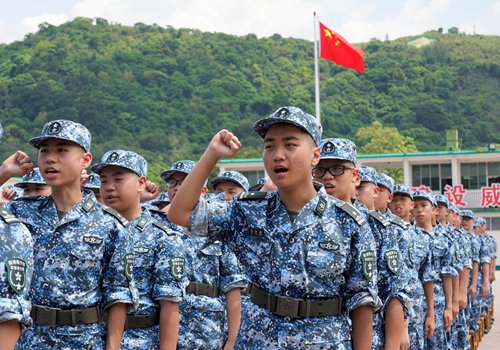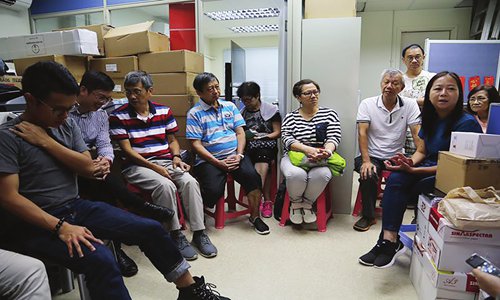HOME >> CHINA
Mainland is HK’s future
By Yang Sheng and Fan Lingzhi Source:Global Times Published: 2019/7/17 23:08:40
Western media misguides youth to confront motherland

Students take an oath at the start of the Military Summer Camp For Hong Kong Youth on Monday. The 14-day camp, attended by 600 students, is being held at the San Wai Barracks of the Chinese People's Liberation Army Garrison in Hong Kong Special Administrative Region. Photo: VCG
Western media is instigating the youth in Hong Kong to confront their motherland and inciting conflict between the special administrative region and the mainland by justifying their violent protests as "a movement to preserve Hong Kong's freedoms."
Time magazine made such a justification for the protesters when it released a list of "the 25 Most Influential People on the Internet" on Tuesday, and Hong Kong protesters were included.
TIME said the protests in Hong Kong are "leaderless by design." While there's no single leader at the center of the demonstrations sparked by the extradition bill, "there is still a center to much of their organization: online platforms put to effective use by protesters who want to stay both active and anonymous," TIME further said.
TIME also quoted a Telegram channel linked to the protests, describing the process as "more of a direct democracy." Telegram is a social media network widely used by Hong Kong protesters
Ashley Tse Hiu Hung, 29, chairwoman of Hong Kong Youth Enlightenment, told the Global Times on Wednesday that Western media like TIME keep misguiding the youth in Hong Kong by using beautiful words like "democracy" or "movement to preserve freedoms" to justify these protests.
"Although the protests had no clear leader, it is not hard to find a team that works 24 hours to provide information and organize the protests, and the Western media didn't report the rumors and radical words being spread in these online platforms," Tse said.
In a Telegram channel run by the protesters, the Global Times reporters saw information that teaches the protesters how to avoid the police after they engage in unlawful behavior, and reporters also saw speeches discussions of violence, hostility and racism against the mainland.
Most Hong Kong young protesters have never read the full text of the extradition bill, and whatever they have read about the bill often came from social media networks which provide extremely biased and terrifying messages, such as "you will be arrested and disappear in the mainland [if the extradition bill is passed]."
Observers said the online platform can keep users active and anonymous so that they don't need to be responsible for their words. Many of them spread rumors and incite hostility between the protesters and the police, the reporter found.
Calling this situation "direct democracy" is nonsense, and instigating Hong Kong youth to confront their motherland and the government won't solve the problem the youth are concerned about. They destroy their future and harm Hong Kong society, Tse noted.
According to hongkongfp.com on Wednesday, some Hong Kong pro-West groups and student unions have urged US politicians to pass a draft law on Hong Kong's "human rights and democracy" as soon as possible. These people desperately want foreign forces to interfere in China's internal affairs in Hong Kong.

A group of Hong Kong residents in Kwun Tong district discuss local affairs at a residential community office on Saturday. Photo: Chen Qingqing/GT
General education
It is difficult to reasonably and effectively communicate with the youth, and apart from being misguided by the Western media, another reason is that education in Hong Kong is very problematic, some pro-establishment Hong Kong lawmakers noted.
Hung Kam-in, a member of the Kwun Tong District Council in Hong Kong, told the Global Times that "many young Hong Kong people stubbornly believe that they are doing the right thing to save Hong Kong," when they rudely stormed the Legislative Council or beat police officers with steel bars, bricks and umbrellas.
Tang Fei, the principal of TKO HeungTo Secondary School in Hong Kong and former chairman of the Hong Kong Federation of Education Workers, said that anti-mainland opposition groups have hijacked general education in Hong Kong.
General education is one of the four courses that students need to pass in the city's college entrance examination. The other three courses are Chinese, English and math. General education includes six different units, including interpersonal relationship, Hong Kong today, modern China and globalization.
However, there are no standard textbooks for all Hong Kong schools. Different schools use different textbooks and many of these books edited by anti-mainland forces will make the content biased and misguided to demonize the mainland and the "one country, two systems," said Chinese mainland experts.
By talking with young Hong Kong people, the Global Times reporters found that many have limited knowledge about the development of the mainland and China's international influence. The mainland's image in their mind was truly outdated.
A mainland student at the University of Hong Kong who requested anonymity said that "they [the anti-mainland Hong Kong students] are surprisingly ignorant about the country, as well as the current international situation. This makes our education very hard to move on."
Tse stressed that in order to fix the problem, the government must recruit more teachers who are patriotic and knowledgeable rather than letting anti-mainland opposition forces dominate the city's education.
Future and hope
Not every young Hong Kong person refuses integration and challenges their motherland.
Ng Hok Ming, Executive Chairman of the Guangdong-Hong Kong-Macau Greater Bay Area Youth Association, who graduated from Harvard University and resides in Hong Kong now, is promoting youth exchange between Hong Kong and the mainland and helping the youth start business in the mainland.
He believes that Hong Kong's youth need to be more intelligent and open-minded, because there are opportunities in the mainland, since sci-tech and innovation industries in the mainland are developing fast.
Tse said integration between the mainland and Hong Kong has been demonized to some extent due to the long existing anti-mainland education and propaganda by opposition groups.
"I strongly advise protesters to think carefully. Violence and protests are not going to solve the problem, including economic problems. These will only harm the city and themselves. Why not just put your time and strength to learn and see, to find opportunities and to be more competitive?"
Posted in: POLITICS,HK/MACAO/TAIWAN